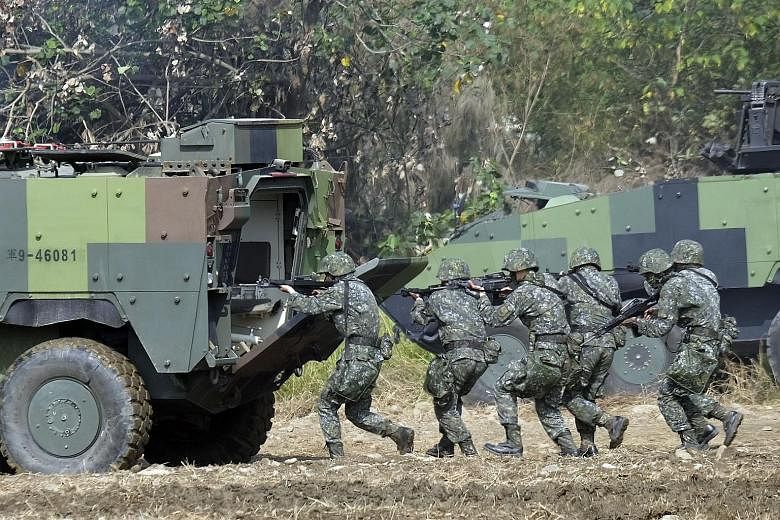From cyber attacks to urban warfare, Taiwan defence experts have come up with a way for the island to defend itself against an increasingly powerful and richer Chinese military, without breaking the bank.
Speaking to The Straits Times ahead of Taiwan's release of its quadrennial defence review this week, they say Taiwan needs to re-draw its battle plans given a limited budget and manpower constraints.
Instead of becoming too reliant on the firepower of precision weapons, troops should hone their expertise in cyber warfare and take advantage of Taiwan's cities, using the concrete jungle to wear down their Chinese opponents, the experts, all former top defence officials, say.
Taiwan has for a long time adopted a defensive strategy by hardening potential targets and beefing up air defence capabilities with long-range missiles to prevent any possible Chinese attacks.
But the experts say a new approach is needed given the increasing sophistication of China's military and growing expenditure. Beijing recently announced a 7 per cent rise in defence spending for this year. The estimated 1.44 trillion yuan (S$300 billion) is about 14 times larger than Taiwan's defence budget.
That meant it was pointless to try to compete with China's military, which has deeper pockets and more resources at its disposal, said former deputy defence minister Lin Chong-pin. Another problem was the reluctance of some nations to sell military hardware to Taiwan.
Taiwan, for instance, had to wait more than 10 years before it managed to buy F-16 fighter jets from the United States. Despite numerous requests, the US approved the long-delayed sale of second-hand US Navy frigates and upgrades for the island's ageing F-16s, among other things, only in the past eight years.
This is because of Taiwan's relationship with China, which still considers the island a breakaway province. Beijing has always raised protests whenever the US, which cut diplomatic ties with Taiwan in 1979 to establish relations with China, sells arms to the island, insisting that it sticks to the one-China policy.
Taiwan has also turned to building its own military equipment.
The current military strategy might not be enough for Taiwan to survive beyond the first wave of rapid-fire attacks, said Dr Lin.
Instead, the military should focus on urban guerilla warfare, adding that it would make it difficult for People's Liberation Army troops to fight because it would be "harder to win and also harder to walk away from".
Dr Lin told The Straits Times that Taiwan should adopt a "war of paralysis" to deter China's battle planners. "It will be too expensive, too messy, and any bloodshed would do great damage to China's claim of peaceful reunification... that would be a very effective deterrent."
To get the upper hand in an increasingly high-tech battlefield, Dr Lin said Taiwan should sharpen cyber-warfare capabilities to cripple the weapons and communications systems of any invaders. "It is cheap, does not require a critical mass of soldiers" and may not even involve shots being fired, he added.
Beyond sharpening its arsenal, National Chengchi University national security expert Francis Kan said Taiwan should also continue to strengthen its existing links with the United States.
"US leadership has been the backbone of the region's stability for decades. The Americans know that they cannot retreat, much less leave, because their strong presence is what will guarantee a peaceful rise of China," said Dr Kan, who spoke recently at a defence forum organised by the Taiwan Foreign Correspondents' Club.
Former defence minister Andrew Yang also told the forum that Taiwan should continue to allocate sufficient money and resources to train tech-savvy soldiers and retain talent to maintain a modernised and well-equipped fighting force.
Noting the difficulties the military faces in attracting and retaining troops, Dr Yang, who is the secretary-general of the Chinese Council of Advanced Policy Studies, told The Straits Times: "What you lack in numbers you have to make up for with a well-trained and motivated lot of soldiers. It is their will and wits that will be critical in the battlefield."

